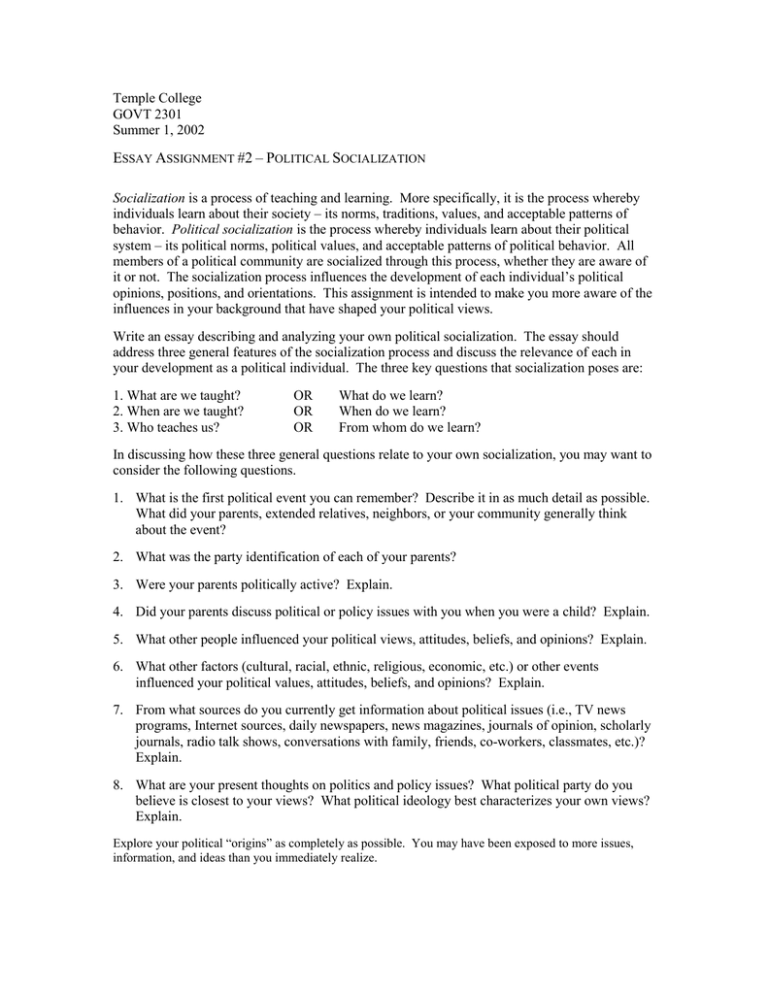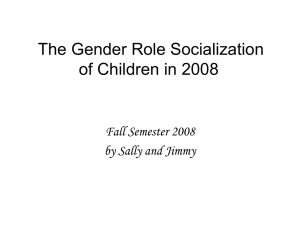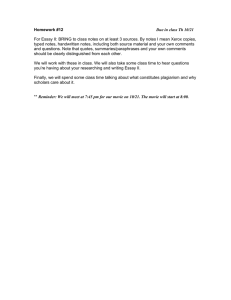– E A #2
advertisement

Temple College GOVT 2301 Summer 1, 2002 ESSAY ASSIGNMENT #2 – POLITICAL SOCIALIZATION Socialization is a process of teaching and learning. More specifically, it is the process whereby individuals learn about their society – its norms, traditions, values, and acceptable patterns of behavior. Political socialization is the process whereby individuals learn about their political system – its political norms, political values, and acceptable patterns of political behavior. All members of a political community are socialized through this process, whether they are aware of it or not. The socialization process influences the development of each individual’s political opinions, positions, and orientations. This assignment is intended to make you more aware of the influences in your background that have shaped your political views. Write an essay describing and analyzing your own political socialization. The essay should address three general features of the socialization process and discuss the relevance of each in your development as a political individual. The three key questions that socialization poses are: 1. What are we taught? 2. When are we taught? 3. Who teaches us? OR OR OR What do we learn? When do we learn? From whom do we learn? In discussing how these three general questions relate to your own socialization, you may want to consider the following questions. 1. What is the first political event you can remember? Describe it in as much detail as possible. What did your parents, extended relatives, neighbors, or your community generally think about the event? 2. What was the party identification of each of your parents? 3. Were your parents politically active? Explain. 4. Did your parents discuss political or policy issues with you when you were a child? Explain. 5. What other people influenced your political views, attitudes, beliefs, and opinions? Explain. 6. What other factors (cultural, racial, ethnic, religious, economic, etc.) or other events influenced your political values, attitudes, beliefs, and opinions? Explain. 7. From what sources do you currently get information about political issues (i.e., TV news programs, Internet sources, daily newspapers, news magazines, journals of opinion, scholarly journals, radio talk shows, conversations with family, friends, co-workers, classmates, etc.)? Explain. 8. What are your present thoughts on politics and policy issues? What political party do you believe is closest to your views? What political ideology best characterizes your own views? Explain. Explore your political “origins” as completely as possible. You may have been exposed to more issues, information, and ideas than you immediately realize. This assignment calls for some honest self-examination. The instructor is not going to run a background check to see if the information you provide is TRUE. You will NOT be graded on whether the description of your socialization is correct or whether the values and opinions you hold are valid. Rather, you will be graded on whether your description of your socialization demonstrates an understanding of the socialization process generally and whether the information you provide is consistent. The information you provide should be specific. Give examples to illustrate your points. Avoid cliches and other stock expressions. They are more likely to get in the way of genuine self-understanding than promote it. Do NOT write an essay in which you attempt to convince me of the “righteousness” of your views. This approach is not consistent with the purpose of this assignment. Do NOT write an essay in which you argue that you have no political opinions or values – therefore, you have not been socialized. The fact of the matter is that even the truly apolitical among us developed that posture as a result of socialization. So if you really want to make the case that you have no political opinions or values, you must discuss the factors that have alienated you from politics. You should not limit yourself ONLY to these questions; nor should you feel obligated to answer ALL of these questions. Ask (and, of course, answer) your own questions. In any event, your editorial essay should be THESIS-CONTROLLED. Do not simply list answers to these questions in a disjointed fashion. Provide examples to illustrate your points, but do NOT just repeat what you have read or string together quotes. Your essay should be well-written, cogent, and thorough yet concise. You MAY use any source you like [beyond the text] to expand and support your arguments. You should cite any sources that you use. Use any citation style you prefer, but be consistent throughout. If you are uncertain when citations are appropriate, consult the instructor!! [See plagiarism section below.] The instructor will NOT be looking for evidence that you have consulted outside sources - that is, YOU ARE NOT REQUIRED TO CONSULT SOURCES BEYOND YOUR TEXT. You will turn your essay in electronically (via e-mail). To do this, type your essay on a PC and save as an MS-Word file. [The file must be saved in this format. If your home or office PC uses Word Perfect or some other word processing program, be sure to convert the file to MS-Word.] Send the file to wfeagin@templejc.edu as an attachment to an e-mail message. The essay is due no later than Saturday, June 29 at 12:00pm (noon). Avoid plagiarism! Plagiarism is the act of taking words, sentences, paragraphs or ideas from another person’s work and passing it off as one’s own. This is a severe violation of academic integrity and is subject to disciplinary action under the College’s policy. Common forms of plagiarism include: (1) taking passages from another person’s writings, unchanged, and passing it off as one’s own work [whether the original author has knowledge of this or not]; (2) taking a passage from another person’s writings, changing a word here or there, and passing it off as one’s own work; (3) turning in a paper that consists, partially or wholly, of paraphrases of another person’s writings or ideas without proper citations. [With citations, you avoid plagiarism, but the paper would still lack any originality and would, therefore, merit a low score. So generally, avoid writing a paper that consists mainly of quotes or paraphrases of someone else’s work.] This list is not exhaustive of the various forms of plagiarism. If you are unsure whether you have written constitutes plagiarism, please consult me.




